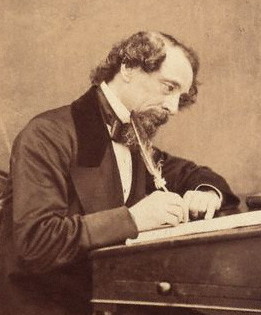This week the BBC reported – in its own strange way – that court proceedings will be digitally recorded instead of taken down by dedicated stenographers.
This could be said to bring an end to a tradition going back to the 17th Century. It’s also quite a sad goodbye to a profession that has included an aspiring author known as Charles Dickens.
Dickens later referred to the job in his autobiographical novel David Copperfield, although not in altogether favourable terms:
I bought an approved scheme of the noble art and mystery of stenography (which cost me ten and sixpence); and plunged into a sea of perplexity that brought me, in a few weeks, to the confines of distraction. The changes that were rung upon dots, which in such a position meant such a thing, and in such another position something else, entirely different; the wonderful vagaries that were played by circles; the unaccountable consequences that resulted from marks like flies’ legs; the tremendous effects of a curve in a wrong place; not only troubled my waking hours, but reappeared before me in my sleep.
Dickens, like today’s stenographers, worked freelance – first at the civil courts known as the ‘Doctor’s Commons’ before stepping up to the Houses of Parliament, aged 19, in 1831. His reports were supplied to journals and newspapers including the True Sun and the Morning Chronicle.
Although there is no direct evidence he plied his trade at the Old Bailey, there is a transcript from a murder trial in the Dexter collection of Dickens papers at the British Library. It reports on the case of three men accused of carrying out two killings so they could sell the body to anatomy lecturers.*
Dickens did however write a sketch about his visit to Newgate Prison and based at least one character on a famous murderess [Mademoiselle Hortense in Bleak House].
But the history of ‘court reporting’ at the Old Bailey isn’t a simple one. The first comprehensive ‘Proceedings of the Old Bailey’ (rather than individual reports of famous cases) was published commercially in the late 17th Century. By 1787, as the newspapers began printing their own reports, they were being subsidised by the City of London. By 1834, when the Bailey became the Central Criminal Court, they were pretty-much publicly funded.**
Anyone can now read these reports online, for free. That is until 1913 when they stopped, undercut by the official appointment of shorthand writers by the state following the Criminal Appeal Act of 1907. For records after that date you have to search through files at the National Archives, although no doubt a lot of material has just been chucked out.
In recent years the official task of taking a full note of proceedings has been farmed out to a private company, Merill Legal Solutions. I’m not sure what happens to their records, although I’ve heard they get destroyed after six years. As for getting hold of a copy of a transcript, only law firms and the government can afford the fees.
All of which means that once the government decided not to continue the contract past March 2012, the stenographers effectively lost their jobs. Some may leave the profession altogether.
Their role is now taken over by the clerk of the court, who will have to press the right button at the right moment to ensure the case is being recorded. What will happen to those recordings? Will they be transcribed and published online (like they do in some American courts)?
Somehow, I doubt it. Stenography will now only live on in the shorthand of the motley assortment of hacks who dart from court to court looking for a story. Although some say this is also a dying art.
____________________
*Another report of the trial of Bishop, Williams and May can also be found on the Proceedings of the Old Bailey website.
**The publishing history of the Proceedings of the Old Bailey can be found here

